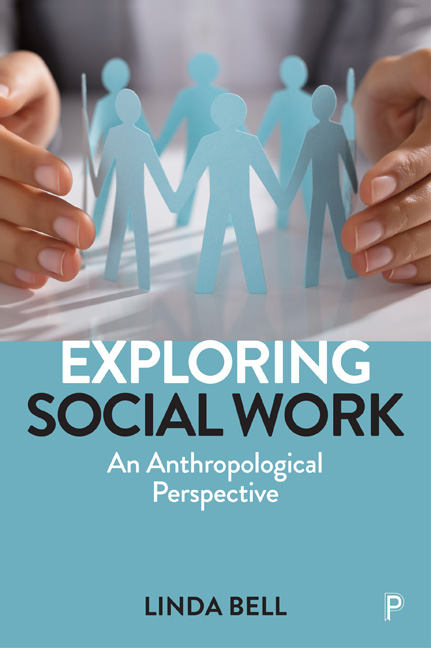Book contents
- Frontmatter
- Dedication
- Contents
- Acknowledgements
- Preface
- 1 Introducing Social Work: Who are Social Workers? Why do we Need Them?
- 2 Getting Involved: An Anthropological and Auto-Ethnographic Journey
- 3 Time and Change: UK Social Work and Comparative European Welfare Policies Since 1990
- 4 Becoming: Being Admitted, Educated and Trained in Social Work
- 5 Growing: Experiencing Social Work Education and Socialisation
- 6 Identifying
- 7 Valuing and Transgressing
- 8 Relating and Partnering: Social Workers, Clients/Service users and other Professionals
- 9 Knowing and Evidencing: Building a Research Base, Mapping and Modelling
- 10 Organising: Influences of the state, Organisations and Wider Social Policies
- 11 Symbolising: Cultural Representations in Theory and in Practice
- 12 Changing: The Future – Social Work in Wider Society
- References
- Index
12 - Changing: The Future – Social Work in Wider Society
Published online by Cambridge University Press: 04 March 2021
- Frontmatter
- Dedication
- Contents
- Acknowledgements
- Preface
- 1 Introducing Social Work: Who are Social Workers? Why do we Need Them?
- 2 Getting Involved: An Anthropological and Auto-Ethnographic Journey
- 3 Time and Change: UK Social Work and Comparative European Welfare Policies Since 1990
- 4 Becoming: Being Admitted, Educated and Trained in Social Work
- 5 Growing: Experiencing Social Work Education and Socialisation
- 6 Identifying
- 7 Valuing and Transgressing
- 8 Relating and Partnering: Social Workers, Clients/Service users and other Professionals
- 9 Knowing and Evidencing: Building a Research Base, Mapping and Modelling
- 10 Organising: Influences of the state, Organisations and Wider Social Policies
- 11 Symbolising: Cultural Representations in Theory and in Practice
- 12 Changing: The Future – Social Work in Wider Society
- References
- Index
Summary
Through this journey, I have tried to examine social work in both its broad manifestations as a practice-based profession and as an academic discipline. In doing so, I have: focused on what social work informants discussed and explored with me; included what social workers, including students, revealed as participants during some of my earlier research projects, including my work with colleagues; and presented some of my own reactions to all of these responses and dialogues.
I have also drawn upon published research and policy literature to provide readers with some wider understanding of how social work and social workers, as well as those working in related occupations (such as social pedagogy), are said to operate in England and other UK countries, as well as in selected countries in Europe. Inevitably, by focusing to a large extent on how social workers have explained their own views of themselves, my resulting view of social work is a selective and partial one. However, as a counterpart to this, I have tried to use my anthropological background to discuss and explore my own involvement with social work since the early 1990s, while continuing to reflect on and ask what (I hope) are relevant questions when exploring social work.
I expect that all this material still raises issues about what social work is, and who it is for: is social work, for example, essentially a political project that challenges orthodox thoughts on behalf of those who are perceived to be economically disadvantaged (in all kinds of societies)? Is it aiming to bring about (absolute) equality, or fairness, for all citizens? Do social workers try to ‘help those who help themselves’? Social workers have sometimes seemed to favour a more universalistic approach to their work (in line with the International Federation of Social Workers [IFSW] definition), even while policy intentions (as well as state and other funding) in some countries seem to expect social work to become ever narrower and more targeted on certain sections of society. Even if, as an anthropologist, I try to reject the idea of an overarching and globalised form of social work culture, there are clearly some key threads running through this narrative.
- Type
- Chapter
- Information
- Exploring Social WorkAn Anthropological Perspective, pp. 169 - 176Publisher: Bristol University PressPrint publication year: 2020

